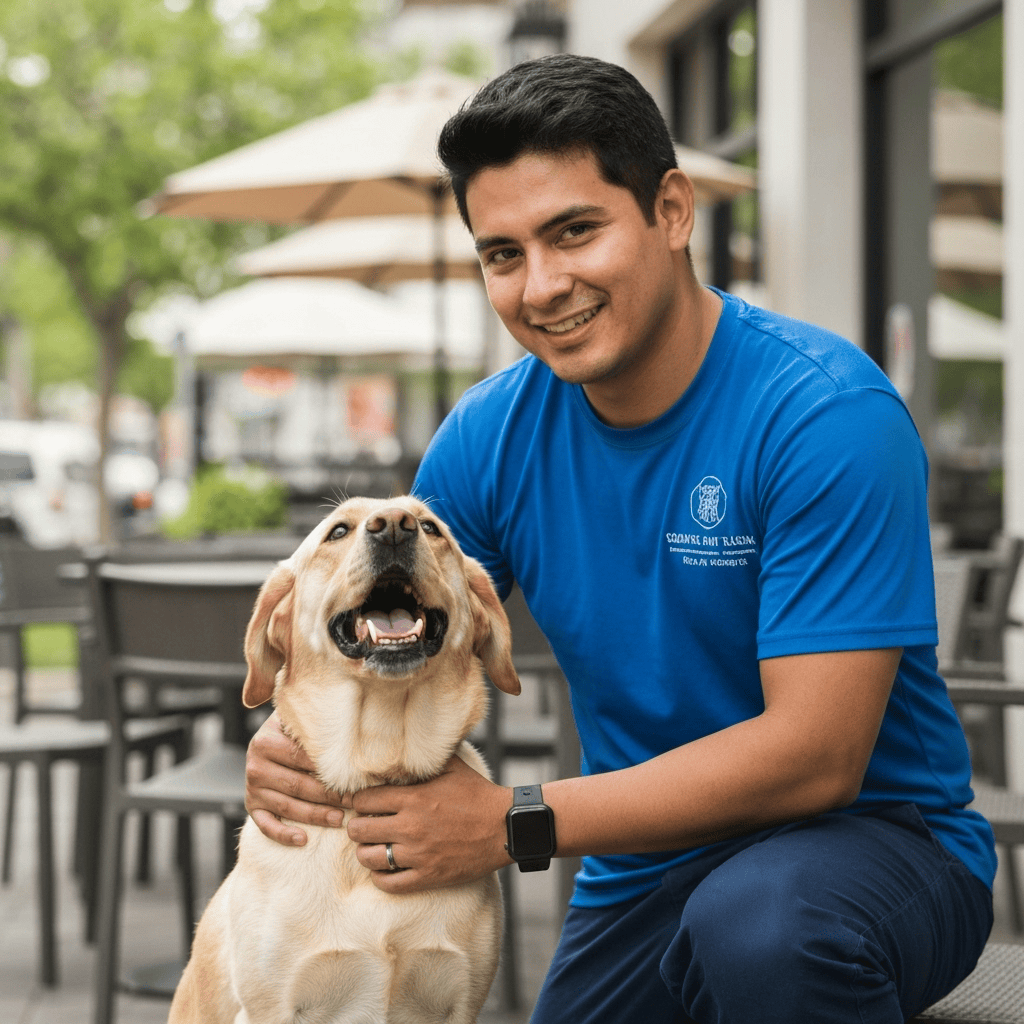Your Complete Guide to Choosing a Dog Trainer in Cary
Living with a dog in Cary means you want to enjoy those leisurely walks along the greenways, grab coffee together on Academy Street patios, and feel confident your pup has good manners at the busy family parks. But getting there takes some work.
When you’re looking for training that actually works in neighborhoods like Preston, Lochmere, Amberly, and MacGregor Downs, you need someone who understands what daily life looks like here. Your dog needs to walk politely past other dogs, come when called even with squirrels around, and stay calm when kids run by on the playground.
Most families want humane, reward-based training that fits into their already packed schedules. You want clear steps you can practice between sessions, not confusing advice that sounds good but doesn’t work when you’re actually out there with your dog.
Since Wake County rules, Cary dog park policies, and nearby state parks all affect where and how you can train, it helps to work with someone who knows these local details. They can guide you through the practical stuff while helping your dog learn the skills that matter most for your life together.
How to Choose the Right Trainer
Start by looking for someone who focuses on positive reinforcement training that rewards the behaviors you want to see more of. This approach builds confidence and trust, which makes everything else easier.
Ask about their experience with your specific goals. Whether you’re dealing with puppy training, leash reactivity, or separation anxiety, you want someone who’s helped other dogs work through similar challenges.
Credentials can help you sort through your options and compare expertise. Many solid professionals hold dog trainer certifications like KPA-CTP, CPDT-KA, IAABC-CDBC, CBCC-KA, or CTC.
If you’re planning to practice at Cary parks or along the local greenways, ask how they’ll prepare your dog for all those distractions. Strollers, cyclists, and other dogs are part of daily life here, so your training needs to account for that reality.
For families living in apartments or townhomes, in-home dog training becomes especially important. You need help with barking that bothers neighbors, potty training in small spaces, and managing reactivity in elevators or narrow hallways.
Common Dog Training Methods Explained

The best Cary programs stick to humane methods that build your dog’s trust and confidence rather than creating fear or stress.
Basic obedience and city manners cover the essentials like sit, down, stay, leash training, and polite greetings that make life smoother at parks and dog-friendly patios. Behavior modification tackles tougher issues like fear, reactivity, and aggressive dog training using careful desensitization and counterconditioning techniques.
Puppy classes focus on socialization, potty training, and bite inhibition during those crucial early months. Private lessons let you customize training sessions for your specific home routine, yard setup, and neighborhood walk routes.
Group classes add controlled distractions once your dog is ready to practice around other dogs and their people. Board and train and day training programs can jump-start skills, but remember that you’ll still need coaching to maintain that progress once your dog comes home.
Service dog training and therapy dog training require specialized knowledge and lots of public-access work. Avoid any methods that rely on fear, intimidation, or pain – reward-based dog obedience training creates lasting results and keeps your relationship strong.
Average Cost of Dog Training in Cary NC (Updated for 2025)
Training costs in Cary and Wake County vary quite a bit depending on the trainer’s experience, how long sessions run, and whether you choose in-home visits, group classes, or intensive programs.
| Service Type | Cary Area Average | Notes |
|---|---|---|
| Group classes 4 to 6 weeks | $160 – $300 | Puppy classes and basic obedience most common |
| Private lessons 60-90 minutes | $110 – $185 per session | In-home often at the higher end |
| Puppy training package 4 to 6 lessons | $380 – $650 total | May include phone or email support |
| Behavior consult initial session | $140 – $250 | For reactivity, fear, or bite risk |
| Day training per week | $500 – $950 | Trainer works your dog, then coaches you |
| Board and train 2 to 4 weeks | $2,200 – $4,800 total | Ask for daily handling and transparency |
| Online coaching package | $150 – $350 | Works well for manners and follow-ups |
Many Cary-area trainers offer a free consultation or evaluation call to talk through your goals and see if you’re a good fit. You can expect to pay more for complex behavior cases or when working with trainers who have advanced credentials and lots of experience.
Questions to Ask a Potential Dog Trainer
- What methods do you use, and how do you keep training sessions low-stress and reward-based?
- What kinds of issues do you work with most – things like reactivity, separation anxiety, or basic manners?
- What does your training program actually include, and how do you measure progress along the way?
- Do you offer in-home dog training, group classes, or private lessons, and which approach fits my goals best?
- What credentials do you hold, and how do you stay current with new research and techniques?
- Do you carry liability insurance, and can you show me proof of that coverage?
- What kind of practice should I expect to do between sessions, and realistically how much time will that take each week?
- If we meet in public spaces, how do you choose safe locations and handle the logistics in Wake County parks?
Local Cary Resources for Dog Owners
These local resources can support your training efforts and help you understand the rules that affect dog owners in the area.
Cary Dog Parks membership info and rules for Jack Smith Park and Godbold Park: Cary Dog Parks
Jack Smith Park Dog Park details, hours, and amenities: Jack Smith Park
Cary Police Animal Services for leash laws, nuisance complaints, and animal concerns: Cary Animal Services
Wake County Animal Services for rabies clinics, lost and found pets, and general pet owner resources: Wake County Animal Services
American Tobacco Trail in Wake County for leashed training practice with cyclists and runners: American Tobacco Trail
William B. Umstead State Park leashed-dog trails for practicing recall and stays with natural distractions: Umstead State Park
Jordan Lake State Recreation Area trails and picnic areas that welcome leashed dogs: Jordan Lake SRA
Apex Nature Park Dog Park just outside Cary with separate areas for large and small dogs: Apex Dog Parks
Lake Crabtree County Park for leashed practice around ducks, joggers, and playground distractions: Lake Crabtree Park
NC rabies requirements and guidance for all pet owners: NCDHHS Rabies
Local Laws, Permits, and Practical Tips
Understanding local rules helps you train more effectively and avoid problems down the road. Cary requires dogs to stay leashed and under control in public spaces, and you need to clean up after your dog right away.
If your dog barks excessively or roams the neighborhood, you could face nuisance complaints handled by Cary Animal Services. North Carolina law requires current rabies vaccination for all dogs, and your dog should wear that rabies tag whenever you’re off your property.
Wake County doesn’t require a general pet license, but some Cary dog facilities like the off-leash parks do require paid membership and proof of current vaccines. Commercial training activities in parks or other public spaces might need facility reservations or permits, so any professional dog trainer should know about insurance requirements and permissions for classes in Town or County venues.
Most of Cary sits in Wake County, but there’s a small section in Chatham County. If you live near Jordan Lake or the western edge of town, double-check the park rules when you’re training in those areas.
How Training Fits Cary Life
Life in Cary means your dog encounters greenways packed with joggers, busy weekend spots full of families, and lots of other dogs out enjoying the same spaces you love. Your dog needs to handle crowds, excited children, and cyclists passing by without getting overwhelmed or reactive.
Start your training in quieter spots like the less busy areas of Bond Park or your own neighborhood sidewalks. Once your dog has the basics down, you can proof those skills at busier locations with more distractions.
If you live near downtown Cary or in one of the condo communities, plan extra practice time for elevator manners, staying calm in lobbies, and quiet crate time when neighbors are close by. For families in Preston, Lochmere, Amberly, and MacGregor Downs, polite walking past other dogs and strollers comes up almost daily, so consistent leash work becomes really important.

Common Questions About Dog Training in Cary
How much does in-home dog training cost?
Most Cary in-home sessions run between $120 and $185 for 60 to 90 minutes, with the price depending on travel distance and the trainer’s expertise. Package deals usually bring down the per-session cost.
Is in-home dog training worth it?
Yes, especially for issues that happen at home like house manners, potty training, door greetings, and behaviors that only show up in your specific environment. It lets a certified dog trainer see exactly what’s happening and tailor solutions to your layout and daily routine.
Can you pay someone to house train your dog?
Absolutely. Many dog training services offer puppy training or day training programs focused specifically on potty training, crate work, and establishing good routines. Just remember you’ll still need to stick to a consistent schedule to maintain that progress.
What is the 3-3-3 rule for dog training?
It’s a helpful guideline for new dogs settling into your home – roughly 3 days to decompress from the change, 3 weeks to start learning your routine, and 3 months to feel completely at home. Think of it as a reminder to be patient and set realistic expectations.
How long will it take to reach my training goals?
Basic obedience skills often take 4 to 8 weeks with daily practice sessions. Behavior modification for issues like fear or reactivity usually takes several months, with careful step-by-step progress and regular coaching to keep you on track.
What should I bring to group classes?
Pack high-value treats your dog loves, a properly fitted collar or harness, a standard 6-foot leash, water for both of you, and vaccine records if the trainer requests them. Leave retractable leashes at home during structured training work.
What’s the leash law in Cary?
Dogs must stay on leash and under your control in all public areas. For enforcement details, nuisance rules, and reporting issues, check with Cary Animal Services.
Do I need a dog license in Cary or Wake County?
Wake County doesn’t require a general pet license, but rabies vaccination is mandatory statewide and your dog should wear the rabies tag when out and about. Get specific details from Wake County Animal Services.
What shots does my dog need in Wake County or North Carolina?
Rabies vaccination is required by state law for all dogs. Your vet might also recommend distemper-parvo combo and leptospirosis vaccines based on your dog’s lifestyle and risk factors. Check the official guidance at NCDHHS Rabies.
Are dog trainers required to be licensed in Cary or Wake County or North Carolina?
North Carolina doesn’t require special licenses for dog trainers. Good professionals carry liability insurance and often hold certifications like KPA-CTP, CPDT-KA, or IAABC-CDBC to show their commitment to ongoing education.
Where can I practice off-leash recall?
The members-only areas at Cary’s dog parks provide safe, fenced spaces for recall practice. Review the rules and membership requirements at Cary Dog Parks. Keep your dog leashed in all other park areas unless signs specifically say otherwise.
Which dog parks allow training around Cary?
Jack Smith Park Dog Park has separate areas for small and large dogs plus room to work on recalls safely. Cary Dog Park at Robert V. Godbold Park offers fenced practice areas for members, and Apex Nature Park Dog Park makes a good nearby option for Wake County residents. Always keep training sessions low-key and respectful so you don’t disrupt other dogs’ playtime.
What beaches or trails allow dogs for training?
Within easy driving distance, focus on the trail options since beaches are far away. Leashed dogs are welcome at Umstead State Park, the American Tobacco Trail, and Jordan Lake SRA. For coastal beaches, rules vary by season and town, so always check local regulations before making the trip.
Do trainers need insurance to work in Cary parks?
North Carolina law doesn’t mandate insurance for trainers, but many venues require proof of liability coverage for any professional activities. If a trainer wants to hold group classes at a Town or County facility, ask how they handle facility reservations and insurance requirements.
Can a trainer work with my vet if behavior meds are needed?
They should be willing to collaborate. For dogs dealing with anxiety, fear, or reactivity, working with your veterinarian alongside structured behavior modification often leads to better outcomes for everyone.
Final Tips for Cary Dog Owners
Choose a professional dog trainer who uses humane methods and can coach you through the daily practice that makes training stick. Plan a clear progression from quiet at-home work to real-world practice at Cary parks and Wake County trails.
Keep your paperwork organized for membership-based dog parks, including current vaccine records. For complex behavior issues, look for expert dog trainers with relevant credentials and clear, transparent training plans.
With thoughtful planning, consistent daily practice, and the right professional support, you can help your dog succeed in all of Cary’s busy, dog-friendly spaces. The key is starting where you are and building skills gradually until both of you feel confident anywhere you go together.
